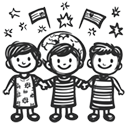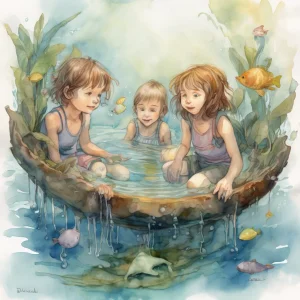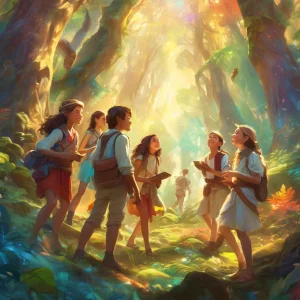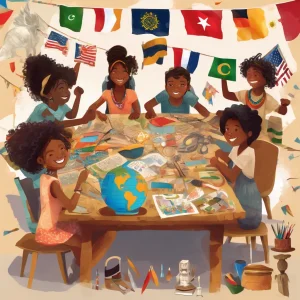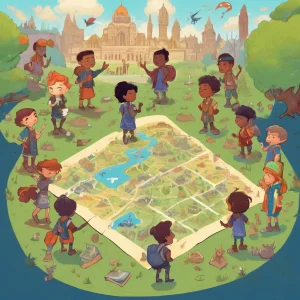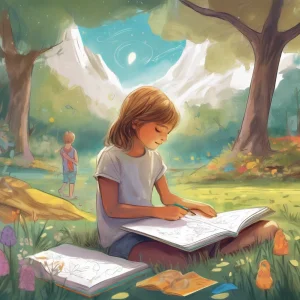Activity
Similar Activities
Nature-Inspired Drawing Activity
Children’s Age: 8–9 years
Activity Duration: 10 – 25 minutes
An outdoor activity where children draw natural elements to foster creativity and ecological awareness.
Activity Duration: 10 – 25 minutes
Nature's Objects: Exploring Buoyancy Adventure
Children’s Age: 6–7 years
Activity Duration: 10 minutes
An engaging hands-on activity for children aged 6-7 to explore buoyancy with natural objects.
Activity Duration: 10 minutes
Digital Beats and Hoop Dreams Coding Adventure
Children’s Age: 9–12 years
Activity Duration: 10 – 20 minutes
An engaging coding activity integrating music production, basketball skills, and teamwork for children aged 9-12 years.
Activity Duration: 10 – 20 minutes
Cultural Creatures: Stop-Motion Animation Adventure
Children’s Age: 4–9 years
Activity Duration: 10 – 25 minutes
An interactive activity using technology to create stop-motion animations exploring plants and animals from diverse cultures.
Activity Duration: 10 – 25 minutes
Enchanted Discovery: Nature Scavenger Hunt with a Twist
Children’s Age: 7–8 years
Activity Duration: 10 minutes
An outdoor educational activity for children aged 7-8 involving a nature scavenger hunt with historical items, leading to a nature collage creation.
Activity Duration: 10 minutes
Shadow Hunt and Solar Exploration
Children’s Age: 5–6 years
Activity Duration: 10 – 30 minutes
An activity combining Physics, Space, and Ecological Awareness for children aged 5-6 to explore shadows and solar energy.
Activity Duration: 10 – 30 minutes
Nature Scavenger Hunt: Adventure in the Wild
Children’s Age: 4–9 years
Activity Duration: 10 minutes
An outdoor, nature-based activity promoting ecological awareness and cognitive development in children aged 4-9 years.
Activity Duration: 10 minutes
Cultural Collage Creations: Exploring World Wonders Together
Children’s Age: 7–9 years
Activity Duration: 10 – 25 minutes
Let's embark on a creative journey with "Cultural Collage Creations"! This educational craft project invites children to explore diverse cultures through art. Gather supplies and c…
Activity Duration: 10 – 25 minutes
The Global Treasure Hunt: Cultural Adventure Quest
Children’s Age: 9–11 years
Activity Duration: 10 – 30 minutes
Get ready for an exciting Global Treasure Hunt adventure! You'll explore different countries, solve clues, and work together in teams. All you need is a map, some clues, and a sens…
Activity Duration: 10 – 30 minutes
Empathy Tales: The Storybook Creation Adventure
Children’s Age: 2–12 years
Activity Duration: 10 – 15 minutes
This activity helps children aged 2 to 6 develop empathy by creating a personalized storybook. You will need paper, crayons, stickers, scissors, glue, and story prompts like "A Day…
Activity Duration: 10 – 15 minutes
Enchanted Coding Adventure Storytelling with Imagination
Children’s Age: 10–12 years
Activity Duration: 45 minutes
The "Coding Adventure Storytelling" activity is tailored for children aged 10-12 to enhance empathy, play skills, language abilities, and introduce basic programming concepts in a …
Activity Duration: 45 minutes
Exploring Nature's Wonders: Nature Photo Journal
Children’s Age: 12–16 years
Activity Duration: 35 – 45 minutes
The "Nature Photo Journal" activity is tailored for children aged 12 to 16, aiming to boost communication skills and ecological consciousness. Participants will need digital camera…
Activity Duration: 35 – 45 minutes


